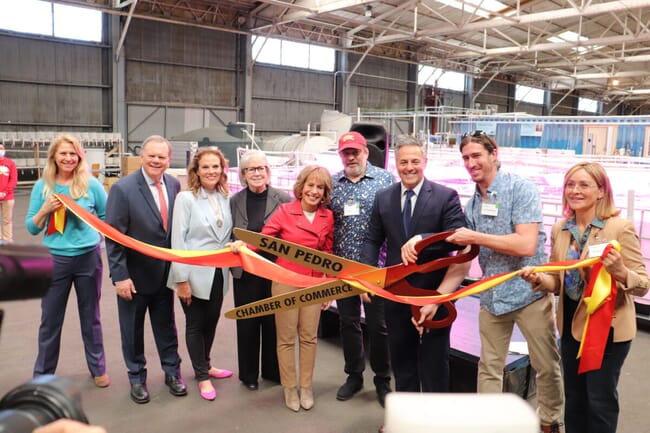
Pictured: Robin Aube, Terry Tamminen, Jenny Cornuelle Krusoe, Melanie Lundquist, President Carol L. Folt, Sergey Nuzhdin, City Councilman Joe Buscaino, Ian Jacobson and Portia Cohen. © VECTIS
On Monday, the University of Southern California (USC) and AltaSea celebrated the opening of a set of new aquaculture labs in AltaSea’s warehouse on a 35-acre property in San Pedro, according to a press release from USC.
The USC Dornsife’s Nuzhdin Aquaculture Lab includes 24 tanks. Some are dedicated to the cultivation of giant kelp for research on its potential as a biofuel and food resource. Another portion of the lab holds large tanks where graduate students are raising oysters and mussels.
Looking out at a crowd of more than 150 people, including 10 students from Professor Sergey Nuzhdin’s lab, USC President Carol L Folt said: “We are the start of an army. … We get to drive the blue economy, sustainability. The oceans not only hold the diversity of life, but they produce the oxygen that goes into the atmosphere. Aquaculture will be part of the ways that we feed the planet, and we will do it in a way that is sustainable.”
Jordan Chancellor, a PhD student working in Nuzhdin’s lab at AltaSea, has started growing oysters and mussels to test them under stressful conditions. She aims to identify and study those genes that make them especially resilient to the extremes wrought by climate change or other changes in the water’s chemistry. The work involves some biology, some genetics and a lot of computational biology — applying computing to assess and analyse the data she gathers on the shellfish.
Though Chancellor knows the work is important for her degree, she is more excited that her research may have a role in ensuring a more stable food supply in the face of immense environmental change.
Her work could help seafood farmers in California’s $200 million growing aquaculture trade produce more sustainable types of mussels and oysters. A resilient shellfish population could reduce uncertainties in supply, a problem for fisherman depending on natural shellfish populations.
Kelp, another fast-growing aquaculture crop, is gaining wider popularity as a climate-friendly vegetable and seasoning agent. It has even been used for producing edible coatings that safely encase pills or vitamins. More recently, kelp has demonstrated its potential as a source for biofuel in recent studies led by Diane Young Kim, a professor of environmental sciences at USC Dornsife’s Wrigley Institute for Environmental Studies.
“We are looking at the giant kelp genome to see what genes make it big,” said Anupam Singh, who recently earned her PhD and studies giant kelp in Nuzhdin’s lab. “Biomass is the key.”
Kelp also is one of the most important food sources for sustaining and sheltering ocean life, including shellfish raised on aquaculture farms along the California coast.
Folt noted that the survival of kelp is a concern. Much of the world’s kelp forests in recent years have been sickened and killed by ocean warming and spikes in acidity.
AltaSea is supported by USC alumni and philanthropists Melanie and Richard Lundquist. Melanie Lundquist, a member of the USC Rossier School of Education Board of Councilors, said that when she learned about AltaSea, she could immediately foresee its potential for helping research that could save species, improve sustainability, grow food and build a new economy.
The Lundquists gave $5 million, drawn by the interest and vision of Leonard Aube, the late executive director of the Annenberg Foundation who passed away in 2015. Lundquist called Aube the driving force behind AltaSea.
“This is not just for Len,” she said. “It’s for the bigger picture of what AltaSea could become for our kids’ and our planet’s future.”
Former Gov Arnold Schwarzenegger also attended briefly via Zoom, saying it was time to “terminate” climate change.




